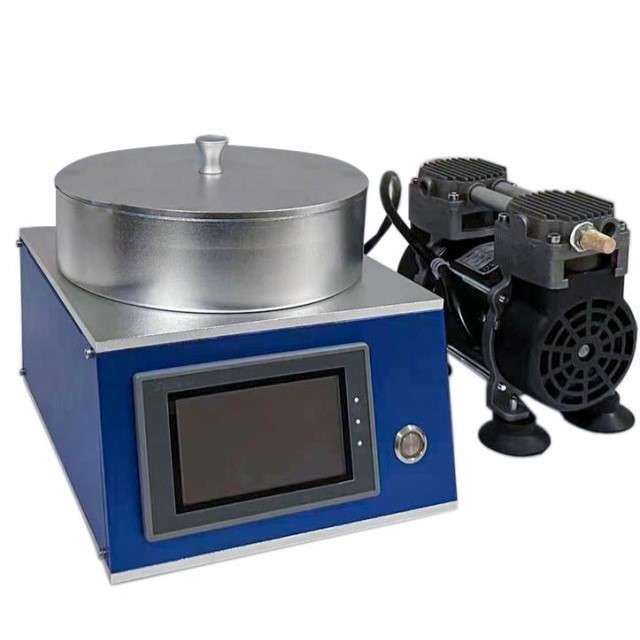
homogenizer
Benchtop Laboratory Homogenizer Mixer with 4 Inch Aluminum Alloy Chamber
Item Number : COA-5
Price varies based on specs and customizations
- Specifications
- Please refer to the chart below for detailed specifications.

Shipping:
Contact us to get shipping details Enjoy On-time Dispatch Guarantee.
Why Choose Us
Reliable PartnerEasy ordering process, quality products, and dedicated support for your business success.
Introduction
The 4-inch aluminum alloy cavity fully automatic laboratory glue dispensing machine is a compact and corrosion-resistant device designed for laboratory use. It features a transparent cover with constant torque positioning, an integrated mold opening inner cavity for easy disassembly and cleaning, and an LCD text display color facial mask button for ease of use. The machine's speed of acceleration and deceleration is controllable and adjustable, and it offers multi-step program operation control. It is equipped with a DC brushless motor and has a maximum recommended spin coating size of 4 inches. The aluminum alloy shell (EZ4 S) is corrosion-resistant, and a PP shell (EZ S PP) is optionally available.
Details & part
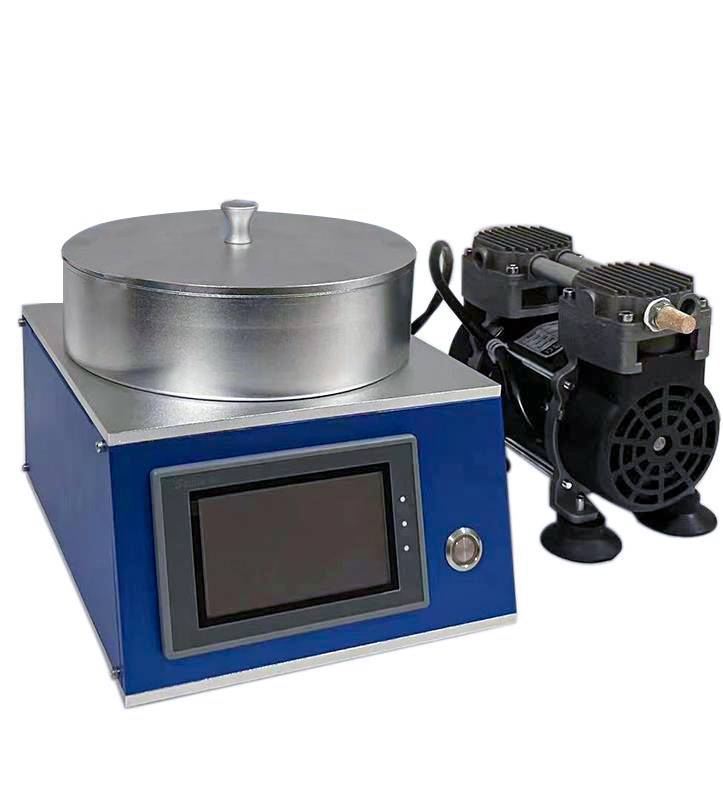
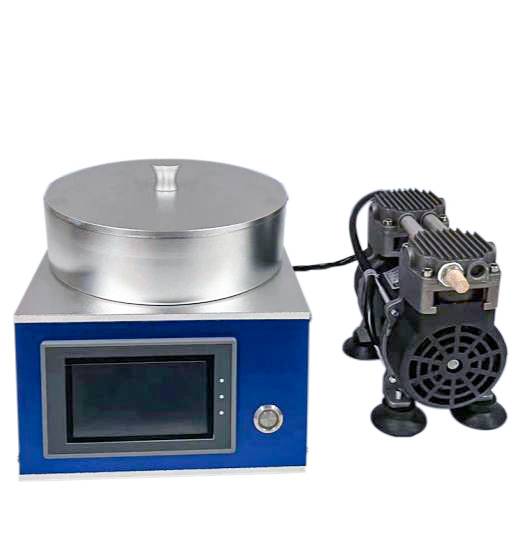
Applications
The 4-inch aluminum alloy cavity fully automatic laboratory glue dispensing machine is widely used in various fields, including:
- Electronic assembly
- Semiconductor packaging
- Biomedical engineering
- Automotive manufacturing
- Aerospace industry
- Food and beverage processing
- Pharmaceutical manufacturing
Features
The 4-inch aluminum alloy cavity fully automatic laboratory glue dispensing machine is a versatile and easy-to-use piece of equipment that is perfect for a variety of applications. With its compact appearance and corrosion-resistant transparent cover, this machine is well-suited for use in glove boxes. The integrated mold opening inner cavity makes it easy to disassemble, clean, and replace, while the LCD text display color facial mask button makes it easy to use.
The speed of acceleration and deceleration is controllable and adjustable, and multi-step program operation control can be set. The DC brushless motor provides maximum recommended spin coating size of 4 inches circular substrate. The aluminum alloy shell (EZ4 S) is corrosion resistant, and the PP shell (EZ S PP) is an optional upgrade.
This machine adopts an automatic lubrication system to supply oil to the upper & lower guide rails, pressure wheels, upper & lower punches, etc. The lubrication time is freely adjusted on the touch screen, so as to obtain the best lubrication effect, reduce noise, and extend the using life of related parts.
Without handwheel control, the main pressure, pre-pressure, and filling volume can be adjusted automatically via touch screen.
With various monitoring and protection functions: raw material level, lubrication oil level, loading and unloading of upper & lower punches, pressure overload, interlock protection of doors & windows, emergency stop
Principle
The 4-inch aluminum alloy cavity fully automatic laboratory glue dispensing machine adopts a piston pump to precisely control the glue dispensing process. The piston moves in the cylinder to generate pressure, which drives the glue to flow out of the nozzle. The flow rate of the glue is controlled by adjusting the speed and stroke of the piston. The machine can dispense glue with different viscosities and dispensing amounts according to the actual needs. The glue dispensing process is stable and reliable, ensuring the accuracy and consistency of the glue dispensing.
Advantages
- Compact appearance, suitable for glove box operation
- Corrosion resistant transparent cover with constant torque positioning for chain positioning
- Integrated mold opening inner cavity, easy to disassemble, clean, and replace
- LCD text display color facial mask button, easy to use
- The speed of acceleration and deceleration is controllable and adjustable, and multi step program operation control can be set
- DC brushless motor, maximum recommended spin coating size: 4 inch circular substrate
- Aluminum alloy shell (EZ4 S) corrosion resistant PP shell optional (EZ S PP)
- This machine adopts automatic lubrication system to supply oil to the upper & lower guide rails, pressure wheels, upper & lower punches, etc., The lubrication time is freely adjusted on the touch screen, so as to obtain the best lubrication effect, reduce noise and extend the using life of related parts.
- Without handwheel control, the main pressure, pre-pressure and filling volume can be adjusted automatically via touch screen.
- With various monitoring and protection functions: raw material level, lubrication oil level, loading and unloading of upper & lower punches, pressure overload, interlock protection of doors & windows, emergency stop.
Technical specifications
| Speed range | 100-99999 rpm |
| Speed resolution | 1rpm |
| Adjustable acceleration range | 100-99999rpm/s |
| Maximum single step length | 3000S |
| Time resolution | 1s |
| Wide voltage application | AC100-230V input, selectable for single or multi step operation in both Chinese and English, with up to 5 sets of 5 step programs available |
| Standard configuration | 10mm, 25mm, and 2-inch vacuum loading trays |
FAQ
What Is A Homogenizer And What Are Its Main Applications?
What Are The Different Types Of Homogenizers Available?
How Does A Homogenizer Work?
What Are The Advantages Of Using A Homogenizer In Laboratory Settings?
Can You Explain The Application Of Homogenizers In Microbial Inactivation?
How Does Homogenization Affect The Quality Of Milk?
4.8
out of
5
Excellent machine for laboratory use. The transparent cover with constant torque positioning is a great feature.
4.7
out of
5
The integrated mold opening inner cavity makes it easy to disassemble, clean, and replace. Highly recommended.
4.9
out of
5
The speed of acceleration and deceleration is controllable and adjustable, which is a great feature. Overall, I am very satisfied with this machine.
4.8
out of
5
The DC brushless motor provides maximum recommended spin coating size of 4 inches circular substrate. This machine is perfect for my needs.
4.7
out of
5
The aluminum alloy shell (EZ4 S) is corrosion resistant, and the PP shell (EZ S PP) is an optional upgrade. I highly recommend this machine.
4.9
out of
5
This machine adopts automatic lubrication system to supply oil to the upper & lower guide rails, pressure wheels, upper & lower punches, etc. This is a great feature that ensures the machine's longevity.
4.8
out of
5
Without handwheel control, the main pressure, pre-pressure, and filling volume can be adjusted automatically via touch screen. This makes the machine very easy to use.
4.7
out of
5
With various monitoring and protection functions: raw material level, lubrication oil level, loading and unloading of upper & lower punches, pressure overload, interlock protection of doors & windows, emergency stop. This machine is very safe to use.
4.9
out of
5
The 4-inch aluminum alloy cavity fully automatic laboratory glue dispensing machine is a versatile and easy-to-use piece of equipment that is perfect for a variety of applications. I highly recommend this machine.
4.8
out of
5
The compact appearance and corrosion-resistant transparent cover make this machine well-suited for use in glove boxes. I am very happy with this machine.
4.7
out of
5
The LCD text display color facial mask button makes it easy to use. This machine is a great addition to my laboratory.
4.9
out of
5
The speed of acceleration and deceleration is controllable and adjustable, and multi step program operation control can be set. This machine is very versatile.
4.8
out of
5
The DC brushless motor provides maximum recommended spin coating size of 4 inches circular substrate. This machine is perfect for my needs.
4.7
out of
5
The aluminum alloy shell (EZ4 S) is corrosion resistant, and the PP shell (EZ S PP) is an optional upgrade. I highly recommend this machine.
4.9
out of
5
This machine adopts automatic lubrication system to supply oil to the upper & lower guide rails, pressure wheels, upper & lower punches, etc. This is a great feature that ensures the machine's longevity.
4.8
out of
5
Without handwheel control, the main pressure, pre-pressure, and filling volume can be adjusted automatically via touch screen. This makes the machine very easy to use.
4.7
out of
5
With various monitoring and protection functions: raw material level, lubrication oil level, loading and unloading of upper & lower punches, pressure overload, interlock protection of doors & windows, emergency stop. This machine is very safe to use.
4.9
out of
5
The 4-inch aluminum alloy cavity fully automatic laboratory glue dispensing machine is a versatile and easy-to-use piece of equipment that is perfect for a variety of applications. I highly recommend this machine.
REQUEST A QUOTE
Our professional team will reply to you within one business day. Please feel free to contact us!
Related Products
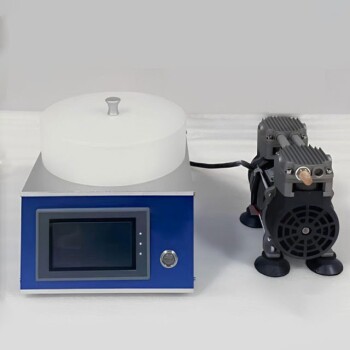
Laboratory Homogenizer Mixer Benchtop 4 Inch PTFE Cavity Homogenizer
4 inch PTFE cavity fully automatic laboratory homogenizer is a versatile laboratory equipment designed for efficient and precise homogenization of small samples. It features a compact design, allowing for easy glove box operation and space optimization.

Laboratory Disc Rotary Mixer for Efficient Sample Mixing and Homogenization
Efficient Laboratory Disc Rotary Mixer for Precise Sample Mixing, Versatile for Various Applications, DC Motor and Microcomputer Control, Adjustable Speed and Angle.
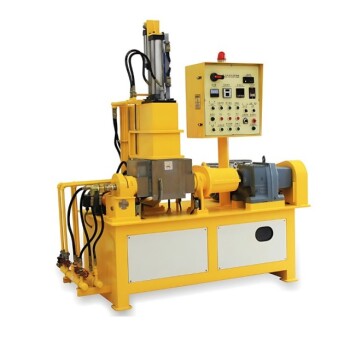
Lab Internal Rubber Mixer Rubber Kneader Machine for Mixing and Kneading
Lab internal rubber mixer is suitable for mixing, kneading and dispersing various chemical raw materials such as plastics, rubber, synthetic rubber, hot melt adhesive and various low-viscosity materials.
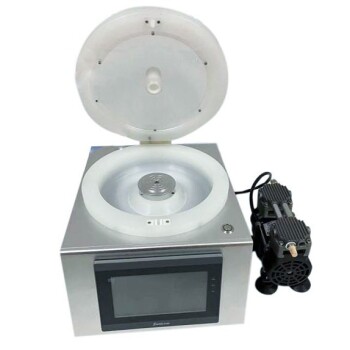
Laboratory Homogenizer Mixer Benchtop Homogenizer with 8 Inch PP Chamber
The 8-inch PP chamber laboratory homogenizer is a versatile and powerful piece of equipment designed for efficient homogenization and mixing of various samples in a laboratory setting. Constructed from durable materials, this homogenizer features a spacious 8-inch PP chamber, providing ample capacity for sample processing. Its advanced homogenization mechanism ensures thorough and consistent mixing, making it ideal for applications in fields such as biology, chemistry, and pharmaceuticals. With its user-friendly design and reliable performance, the 8-inch PP chamber laboratory homogenizer is an indispensable tool for laboratories seeking efficient and effective sample preparation.
Related Articles

Mastering Handheld Coating Thickness Gauges: A Comprehensive Guide for Industrial and Automotive Applications
Explore the intricacies of handheld coating thickness gauges, their applications in electroplating, automotive paint, and powder coatings. Learn how to choose and use these instruments effectively for quality control and cost efficiency.

In-depth Analysis of Tablet Press Machine R&D Lab Model (1)
The Tablet Press Machine R&D Model, also known as a single punch tablet press, is designed for the development and small batch production of tablets. It is widely used in industries such as pharmacy, chemical, food, and metallurgy. This machine operates automatically, continuously filling, pressing, and ejecting tablets. Its key features include high precision filling, low noise, low material consumption, and smooth operation. It is particularly useful for research and development in laboratories, hospitals, and plants, catering to small-scale production needs.

Understanding the Tablet Press Machine R&D Lab Model and its Features(2)
The Tablet Press Machine R&D Model, also known as a single punch tablet press, is designed for the development and small batch production of tablets. It is widely used in industries such as pharmacy, chemical, food, and metallurgy. This machine operates automatically, continuously filling, pressing, and ejecting tablets. Its key features include high precision filling, low noise, low material consumption, and smooth operation. It is particularly useful for research and development in laboratories, hospitals, and plants, catering to small-scale production needs.

Major Equipment in a Dental Laboratory
Overview of essential dental lab equipment including casting, porcelain, polishing, and more.

Electron Beam Evaporation Coating: Advantages, Disadvantages, and Applications
An in-depth look at the pros and cons of electron beam evaporation coating and its various applications in industries.

Comprehensive Guide to Rotary Vane Vacuum Pumps
An in-depth analysis of the structure, working principle, applications, and advantages of rotary vane vacuum pumps.